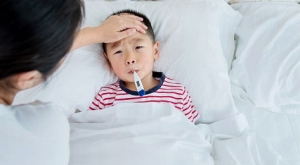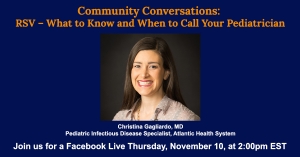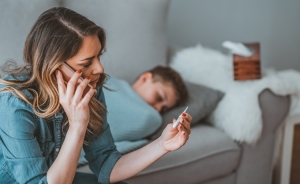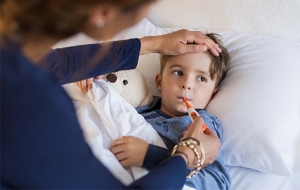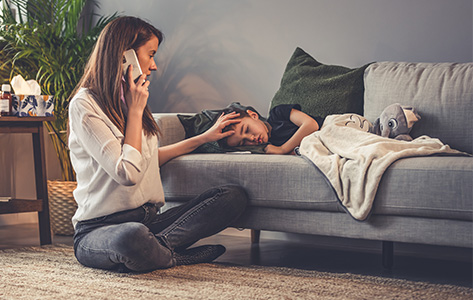
Here's What You Need to Know to Keep Kids Healthy
It’s cold season and every cough and sniffle has parents wondering what their child is coming down with and how to handle it. Eberechi Nwaobasi-Iwuh, MD, FAAP, pediatric infectious diseases consultant and director of the division of pediatric hospital medicine for Hersh Children’s Center at Overlook Medical Center and Goryeb Children’s Hospital in Morristown tells New Jersey Family Magazine everything parents need to know about rhinovirus and enterovirus and how to keep kids healthy.
What’s the difference between rhinovirus and enterovirus?

Dr. Nwaobasi-Iwuh: Rhinovirus and enterovirus are in a class called enteroviruses and there are different subtypes. Rhinovirus, which is often called the common cold, is a subtype. We see rhinovirus year-round, and it usually doesn’t cause too many problems, though it can be a trigger for those with asthma.
Enterovirus peaks in the late summer/fall months and can include things like hand, foot and mouth disease. Enterovirus causes more systemic disease, and it can manifest in kids in different ways. One may have a respiratory illness and another could have hand, foot and mouth disease. The one causing severe respiratory illness in kids right now is a strain called D68. Kids are coming in having difficulty breathing and low oxygen levels. D68 has a pattern with how it circulates–it peaks about every two years. Kids weren’t in school and were masking and now that everyone is back, it makes sense that it has returned.
How can we prevent kids from catching viruses and spreading them?
Dr. Nwaobasi-Iwuh: I always tell parents you can take certain measures but don’t drive yourself crazy. While you can’t completely prevent transmission, short of quarantining in the house, there are common-sense ways to mitigate your risk. Make sure everyone is well-rested and hydrated. If you’re run down, you’re more susceptible to getting sick. Practice hand washing when you get home and before meals. Teach kids to sneeze into the crook of their arm, to turn their face away and to use a tissue and wash their hands after. If you have smaller children, you can disinfect surfaces but it’s really hard since toddlers touch everything.
When kids get sick should they still get tested for COVID?
Dr. Nwaobasi-Iwuh: COVID is still around and circulating so taking a test is reasonable. We test every patient getting admitted into the hospital for COVID.
Should my child wear a mask if they are sick?
Dr. Nwaobasi-Iwuh: If you feel comfortable masking there’s nothing wrong with that. If your child isn’t feeling well, and you are able to keep them home, do that. It gives that child a chance to recover at home and gives their body time to heal. I encourage masking in large, crowded spaces–like at a sporting event, for example. I leave the decision to each individual child and family.
Should we take our kids to the doctor every time they don’t feel well?
Dr. Nwaobasi-Iwuh: If they come home coughing and with congestion–the thing I look at is if they are able to drink well and stay hydrated. Eating will fall by the wayside when kids get sick. If they are able to drink–if they are young and wetting diapers and not dehydrated and breathing is okay, you can monitor symptoms at home. Over age 1, you can give honey to help with a cough. Tylenol is an option to help them feel more comfortable. If they can’t catch their breath or they are just lying around and it’s hard to wake them up, they have a high fever for more than 3 days or if they just don’t look right–and parents know–definitely call the pediatrician.
How can we get kids to stay hydrated?
Dr. Nwaobasi-Iwuh: It’s not just water. Foods that are water-based can work, for example, popsicles, soup, and yogurt. Any non-caffeinated beverage should help. Anywhere from 1-2 ounces every hour is good. Push small amounts frequently, and look in the mouth to make sure it doesn’t look dry. Make sure if they are crying that there are actual tears.
How important is sleep for good health this time of year?
Sleep is really important but getting over 9 hours might be hard for adolescents. Try to create a good sleep hygiene schedule–cell phones stay out of the bedroom so they are not disrupted or distracted. Create an environment conducive to falling asleep easily. A sound machine can help to get their minds to where they need to be for sleep. Finding a routine to fall asleep easily each night is key, which means not waiting until they are already sick to establish it.
Courtesy of New Jersey Family Magazine
Related Articles
Should Parents Expect a Tridemic?
As hospitals report an uptick in cases of COVID, the flu and respiratory syncytial virus (RSV), the United States may be facing a “tridemic.” That may be the last thing you want to hear, but our physician expert shares steps you can take to protect your family from these illnesses. Learn more >
Facebook Live: RSV In the Community
RSV and other seasonal viruses are spreading like wildfire. In to our next Facebook Live, a pediatric infectious disease specialist will answer questions about what symptoms to look for and when to bring your child to the doctor. Watch >
RSV: 9 Things Parents Should Know
How can you protect your children and your family from RSV? What steps do you take if your child gets it? How do you know when to see a doctor? Get the answers from an Atlantic Health physician expert. Learn more >
What Every Parent Needs to Know About the Flu this Season
It’s cold season and every cough and sniffle has parents wondering what their child is coming down with and how to handle it. Atlantic Health System doctors share everything parents need to know about rhinovirus and enterovirus and how to keep kids healthy. Learn more >
